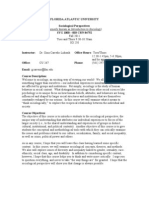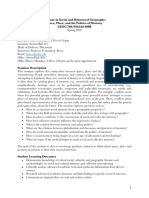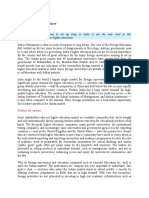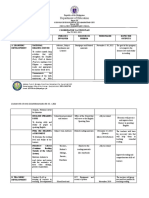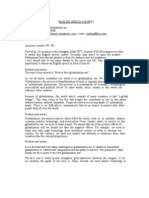Women and Representation IAH 207-702: Literatures, Cultures, Identities Summer 2010, First Session (May 17-June 30)
Women and Representation IAH 207-702: Literatures, Cultures, Identities Summer 2010, First Session (May 17-June 30)
Uploaded by
Shannon SearsCopyright:
Available Formats
Women and Representation IAH 207-702: Literatures, Cultures, Identities Summer 2010, First Session (May 17-June 30)
Women and Representation IAH 207-702: Literatures, Cultures, Identities Summer 2010, First Session (May 17-June 30)
Uploaded by
Shannon SearsOriginal Title
Copyright
Available Formats
Share this document
Did you find this document useful?
Is this content inappropriate?
Copyright:
Available Formats
Women and Representation IAH 207-702: Literatures, Cultures, Identities Summer 2010, First Session (May 17-June 30)
Women and Representation IAH 207-702: Literatures, Cultures, Identities Summer 2010, First Session (May 17-June 30)
Uploaded by
Shannon SearsCopyright:
Available Formats
Women and Representation IAH 207-702: Literatures, Cultures, Identities Summer 2010, First Session (May 17-June 30)
Instructor: Shannon Sears E-mail: searssha@msu.edu Office Hours: MW 4:30-5:30, at the Panera Bread on Hall Rd, 2 miles west of MCC campus Meeting time: MW, 6-10pm Meeting place: Room A-226
Goals of Integrative Studies in Arts and Humanities: Integrative Studies in Arts and Humanities at MSU seeks to assist students to become more familiar with ways of knowing in the arts and humanities and to be more knowledgeable and capable in a range of intellectual and expressive abilities. IAH courses encourage students to engage critically with their own society, history, and culture(s); they also encourage students to learn more about the history and culture of other societies. They focus on key ideas and issues in human experience; encourage appreciation of the roles of knowledge and values in shaping and understanding human behavior; emphasize the responsibilities and opportunities of democratic citizenship; highlight the value of the creative arts of literature, theater, music, and arts; and alert us to important issues that occur among peoples in an increasingly interconnected, interdependent world Course Description: This course will focus on the experience and representation of women in North America, the Caribbean, and Anglophone Europe. Well reflect on and analyze texts and films, both fiction and non-fiction, as we discuss the roles of women in culture beginning in the late eighteenth-century and ending with a film released just last year. We will consider not only how women are represented, but also how they create representations. Additionally, youll notice that, following the one-day unit on May 17, the course is divided into three units: the mind, the body, and the family/social. While these are convenient labels for the major ideas well discuss in the texts that belong to each unit, well work on deconstructing those very labels and exploring how they overlap, intersect, and depend upon one another. Course Goals: This course will introduce you to a wide range of cultural representations of women in an effort to explore the important links and disparities between them. This is an interdisciplinary course that will ask you to engage with a variety of texts from literature, history, and philosophy, as well as films. It is important to the success of the course that you discuss more than just your opinion or knee-jerk reaction to a text or film. By the end of this course you should be able to: * identify and discuss concepts like dehumanize and objectify * articulate well-informed ideas about women and representation in literature, history, philosophy and film * talk/write about multiple texts together * close-read a text/film * write a short paper analyzing the images, themes, and language of a text * construct a written argument about a text * apply the analytical and reflective skills you hone in this class to texts you encounter in your daily lives outside of and beyond this course Required Texts: 1
Mary Wollstonecraft, A Vindication of the Rights of Woman (1792) Kate Chopin, The Awakening (1899) Ami McKay, The Birth House (2006) Julia Alvarez, How the Garcia Girls Lost Their Accents (1991) Fanny Flagg, Fried Green Tomatoes at the Whistle Stop Caf (1987) Short texts to be distributed in class: Joan Dunayer, Sexist Words, Speciesist Roots (1995) Catharine Arnold, Mad Women (2008) Charlotte Perkins Gilman, The Yellow Wall-paper (1892) Djuna Barnes, How It Feels to Be Forcibly Fed (1914) Jill Lepore, Baby Food (2009) Films (to be screened in class): Christie Callan-Jones, Cat Ladies (2009) Katja von Garnier, Iron-Jawed Angels (2004) Stefan C. Schaefer & Diane Crespo, Arranged (2007) Assignments: There are three types of assignments youll complete in this course: 1) a reading journal; 2) two analytical papers; 3) a final project. Each assignment is outlined below, and Ill distribute details about the papers and final project as they approach. Reading Journal: For each day of class that there is a reading assignment, youll write about that assignment in a reading journal. What you write here will serve as a source for class discussion, and will likely also provide you with a starting point for your papers. There is a template for this assignment attached to the end of this syllabus, and specific due dates are indicated in the schedule below. Reading journals must be submitted in word-processing format (i.e. typed) and turned in on the due date. If you have a printer mishap, you can e-mail me your reading journal before class on the day its due and transcribe a written copy to refer to in class that evening; however you get it to me, it must be turned in before/during class on the due date. Late reading journals will not be accepted. Analytical Papers: Youll write two 3-4 page analytical papers for this course. We will practice the skills youll need for these papers in class, so youll receive lots of training and support for these assignments. Ill give you prompts for the first paper, and the direction of your second paper will be up to you, although Ill provide assignment sheets with details for both papers. Final Project: Your final project will consist of several tasks. First, youll find a text or film that relates to our courseit can be a book, a (video)blog, a website, a documentary, a news story, etc. Second, youll analyze what you find the same way well be analyzing texts in class, and youll write a short paper discussing this analysis. Third, youll develop a presentation to be delivered in class based on your short paper. Fourth, youll write a reflective essay about the process of completing your project and its application to life beyond IAH 207. Presentations will take place on the last day of class, and the short papers and reflections that accompany them will be due at that time as well. 2
Grading: Daily Writing: 20% Paper One: 20%
Participation: 15% Paper Two: 20%
Final Project: 25%
Participation: While there will be some lecturing in this course, most of our time will be spent in group discussion. Texts and films are always open to multiple interpretationssomething well talk more about laterand for this reason, part of your grade will be based on your class participation. Asking questions, offering opinions, and responding to your classmates are all part of this category, as are having a hard copy of the text in class with you and taking notes. If you regularly exclude yourself from the conversation, neglect to bring your book/printouts, or turn into a non-responsive zombie as soon as class begins, your participation grade will be lowered. This is particularly relevant in a summer course, which has fewer people: there is a greater burden on you to have something to say in every class. You need to be on time, be prepared, and be engaged. **It is a course policy that no laptops are allowed in class. Please take notes the old-fashioned way. **Texting is likewise not allowed. I can see you texting under your desk or in the back of the room, and your participation grade will be lowered as a result. Attendance: Your attendance at every class meeting is required. You are allowed 1 absence; save it for illness, major religious holidays, funerals, court dates, job interviews, etc. For each additional absence beyond 1, your final grade will be lowered by 0.20. Should a medical or family emergency arise that will require your absence beyond 1 class, please notify me as soon as possible. You will be expected to provide documentation from a physician or hospital and to make up missed work. Students who will use their absence to observe a major religious holiday may make up missed course work only if they make arrangements in advance with me. If a conflict arises between your obligation to attend class and an obligation to the University, it is your responsibility to see me in advance, to hand in all assignments on time, and to make up work missed during your absence. *Students whose names do not appear on the official class list for this course and section may not attend this section. Academic Integrity: Academic honesty entails, among other things, that students will not plagiarize. This means (1) students will not submit someone elses work as their own (e.g. they will not submit another students paper etc., nor will they hand in a paper copied from the web or another published source). Academic honesty also means students (2) will not knowingly permit another student to copy and submit their work as that students own and (3) will not use unacknowledged quotations or paraphrases as part of their work. As provided by university policy, such academic dishonesty or plagiarism may be penalized by a failing grade on the assignment or for the course. Failure in a course as a result of academic dishonesty will also result in written notification to the students academic dean of the circumstances. Additional discussion of cheating or academic dishonesty is available on the Ombudsmans webpage: <http://www.msu.edu/unit/ombud/dishonestystud.html>. Students with disabilities: If you have a documented disability that will affect your performance in this course, please let me know as soon as possible so that we can talk about accommodations.
You should also contact the Resource Center for Persons with Disabilities. You can contact them in person, in 120 Bessey, or by phone at 353-9642 (voice) or 355-1293 (TTY). Course Evaluation: Michigan State University takes seriously the opinion of students in the evaluation of the effectiveness of instruction, and has implemented the SIRS (Student Instructional Rating System) process to gather student feedback. This course utilizes the online SIRS system, and you will receive an e-mail sometime during the last two weeks of class asking you to fill out the SIRS webform at your convenience. This course is enrolled in the SIRS Pilot project and, as a reminder to be sure to fill out the SIRS evaluation form, the final grade for this course will not be accessible on STUINFO during the week following the submission of grades for this course unless the SIRS online form has been filled out. You have the option on the online SIRS form to decline to participate in the evaluation of the course we hope, however, that you will be willing to give us your frank and constructive feedback so that we may instruct students even better in the future.
Semester Schedule
Introductions. Women and Animals Monday, May 17 Syllabus Dunayer, Sexist Words, Speciesist Roots Short film (Cat Ladies) and discussion Unit One. The Mind: Women, Consciousness, and Madness Wednesday, May 19 Arnold, Mad Women Gilman, The Yellow-Wallpaper Chopin, The Awakening DUE: Reading Journal #1 Monday, May 24 Wollstonecraft, selections from Vindications of the Rights of Woman (Introduction; Chapters 2-4; Chapter 8; Chapter 13, Section 6) DUE: Reading Journal #2 Unit Two. The Body: Contested Site of Power Wednesday, May 26 Iron-Jawed Angels (FILM) Barnes, How It Feels to Be Forcibly Fed DUE: Paper One Monday, May 31 MEMORIAL DAYNO CLASS 4
Wednesday, June 2 McKay, The Birth House (Prologue-Chapter 26) DUE: Reading Journal #3 Monday, June 7 McKay, The Birth House (Chapter 27-epilogue) Lepore, Baby Food DUE: Reading Journal #4 Unit Three. The Family and the Social Wednesday, June 9 Alvarez, Garcia Girls (pp. 3-85) DUE: Reading Journal #5 Monday, June 14 Alvarez, Garcia Girls (pp. 86-224) DUE: Reading Journal #6 Wednesday, June 16 Alvarez, Garcia Girls (pp. 225-290) DUE: Paper Two Monday, June 21 Arranged (FILM) DUE: Found Texts Wednesday, June 23 Flagg, Fried Green Tomatoes (pp. 3-150) DUE: Reading Journal #7 Monday, June 28 Flagg, Fried Green Tomatoes (pp. 151-395) DUE: Reading Journal #8 Wednesday, June 30 Final Presentations and Short Papers/Reflections Due
Grading Criteria IAH 207-702 US 2010 Reading Journals: Reading journals will be worth 5 points each, be averaged together, and be worth 20% of your final grade. Criteria for these assignments are below: 1 point: Turned in. May be incomplete or carelessly done. 2 points: Completed. Writing is observational or cursory/unclear. 3 points: Writing is reflective and fairly explained, but not thorough. 4 points: Writing is reflective and thorough. 5 points: Writing is reflective, analytical, perceptive, and thorough. *It is possible to get half points on the reading journals (e.g. 2.5 or 3.5 points).
Papers and Projects: Your papers and projects (including your final presentation) will be graded on a 4.0 scale. Grading criteria for these assignments are explained below: 0.0 Minimum requirements of assignment not met. This may include a piece of writing that does not at all address the assignment, or a case where writing has not been handed in at all. 1.0-1.5 Meets minimum requirements of the assignment. 2.0 Acceptable work. Student has met requirements of assignment and demonstrated a general understanding of writing conventions. 2.5 Average work. Student has met requirements of assignment, worked successfully with writing conventions, and demonstrated the ability to read beyond the surface of a text. 3.0 Good work. Student has demonstrated solid critical thinking and analytical writing skills. Work shows above-average insight. 3.5 Very good work. Student has demonstrated excellent critical thinking skills and analytical writing skills. Work is insightful and original. 4.0 Outstanding work. Student has demonstrated superior critical thinking skills and analytical writing skills. Work is particularly insightful, articulate, original, and polished. *Papers and projects will be graded in 0.1 increments (e.g. 3.1, 3.2, 3,3, 3.4, 3.5)
IAH 207-702 Daily Reading Journal Template with Directions In this section, you can write down your general thoughts about the reading assignment. Possible topics for this section are: why you did/didnt like the reading; what the reading made you think about; significant similarities or differences between this reading and another text, etc. [Be thorough and thoughtful in this section.] Reflection:
In the section below, construct a discussion question that you can pose to the class. After you decide on a question, you should include a short paragraph explaining how you yourself would answer this question. [Your question should require your classmates to analyze the textavoid yes-or-no questions here.] Discussion Question:
Here, you should select a passage from the days reading that you think we should examine closely as a class. It can be as short as a few lines or as long as a couple of pages. Provide the page number(s), indicate how this passage begins and ends, and describe in a sentence or two whats going on in the passage. Once youve done this, you should write a paragraph that analyzes the significance of this passage to the text overall. Does it allude to an important theme?How? Does its language indicate a hidden meaning? If so, what is it? [You should practice your close reading skills in this section.] Passage of Interest:
You might also like
- Experimentation in Software Engineering An Introduction Wohlin PDFDocument2 pagesExperimentation in Software Engineering An Introduction Wohlin PDFJenniferNo ratings yet
- SyllabusDocument8 pagesSyllabusrickyangnwNo ratings yet
- Black Feminism Syllabus FinalDocument9 pagesBlack Feminism Syllabus FinalSaraEllen100% (4)
- Speaking Our Minds-Narrating Mental Illness SyllabusDocument8 pagesSpeaking Our Minds-Narrating Mental Illness SyllabusJoshua GonsherNo ratings yet
- J320: Media, Gender, and DiversityDocument7 pagesJ320: Media, Gender, and DiversityBryce Peake0% (1)
- Principles of Sociology SOC 1101G Stéphan Larose Winter 2014Document7 pagesPrinciples of Sociology SOC 1101G Stéphan Larose Winter 2014Allan JiangNo ratings yet
- Evaluating EHR and Health Care in Jordan AccordingDocument10 pagesEvaluating EHR and Health Care in Jordan AccordingEmmanuel DemostheneNo ratings yet
- IAH 207-703 - The Birth of The Detective: Studies in The Development of Crime & Detection Stories US '11, Session Two (7/5-8/15)Document5 pagesIAH 207-703 - The Birth of The Detective: Studies in The Development of Crime & Detection Stories US '11, Session Two (7/5-8/15)Shannon SearsNo ratings yet
- ENG225.DisabilityinLitSp'23 (11.15 Am) FINALDocument10 pagesENG225.DisabilityinLitSp'23 (11.15 Am) FINALPeter NardiNo ratings yet
- Media and Social Memory - JRN 5770 Syllabus Fall 2011 - Carolyn KitchDocument9 pagesMedia and Social Memory - JRN 5770 Syllabus Fall 2011 - Carolyn Kitchapi-131168509No ratings yet
- United States Syllabus 13-14Document4 pagesUnited States Syllabus 13-14api-233752283No ratings yet
- FOLK - 101-910 Introduction To FolkloreDocument7 pagesFOLK - 101-910 Introduction To FolkloreHambali RamleeNo ratings yet
- Ant2000 201503 LD PDFDocument12 pagesAnt2000 201503 LD PDFAhmed NourNo ratings yet
- ANT 201.syllabus - Spring 2015.garciacolonDocument5 pagesANT 201.syllabus - Spring 2015.garciacolonIsmael García ColónNo ratings yet
- CULT 320-003 G C: Cuytioco@gmu - EduDocument8 pagesCULT 320-003 G C: Cuytioco@gmu - EdumastaliuNo ratings yet
- College Writing 1: "Writing Culture and Identity": Course DescriptionDocument5 pagesCollege Writing 1: "Writing Culture and Identity": Course DescriptionJerome SparrowNo ratings yet
- HUMA1950SU 2023 SyllabusDocument11 pagesHUMA1950SU 2023 SyllabusHumza T kingNo ratings yet
- Introduction To Korean Culture: Course DescriptionDocument4 pagesIntroduction To Korean Culture: Course DescriptionAnonymous 2h3S4S7No ratings yet
- Fys 2019 - Diaz PDFDocument6 pagesFys 2019 - Diaz PDFangelmdiazNo ratings yet
- Envisioning Trauma Syllabus, FA12Document7 pagesEnvisioning Trauma Syllabus, FA12wordsandsteelNo ratings yet
- HIST 355 Fall 2024 Syllabus - FINAL_734f21f32ab831153fb632dcb635ce2dDocument11 pagesHIST 355 Fall 2024 Syllabus - FINAL_734f21f32ab831153fb632dcb635ce2dfcfjdyzg5xNo ratings yet
- Haeselin - F15 Contemporary American Fiction SyllabusDocument13 pagesHaeselin - F15 Contemporary American Fiction SyllabusdhaeselinNo ratings yet
- Popular Culture SyllabusDocument10 pagesPopular Culture Syllabuspaleoman8100% (1)
- Mexico Chicana Literature Imagination SyllabusDocument8 pagesMexico Chicana Literature Imagination Syllabus1321aristaNo ratings yet
- English 383RW (Studies in Women's Fiction/Contemporary Women Writers) Spring 2018 Dr. Caroline SchwenzDocument7 pagesEnglish 383RW (Studies in Women's Fiction/Contemporary Women Writers) Spring 2018 Dr. Caroline Schwenzapi-272756056No ratings yet
- AA History 2 SyllabusDocument8 pagesAA History 2 Syllabusjosh eNo ratings yet
- SOC 150 Course Outline PDFDocument7 pagesSOC 150 Course Outline PDFAuthor 1No ratings yet
- SFASU - Film and Culture SyllabusDocument8 pagesSFASU - Film and Culture SyllabusTitoNo ratings yet
- Cals 160a Student SyllabusDocument9 pagesCals 160a Student Syllabusapi-302217110No ratings yet
- Sociology SyllabusDocument5 pagesSociology Syllabusmichi451No ratings yet
- Lit2000: Introduction To LiteratureDocument9 pagesLit2000: Introduction To LiteraturexersxenNo ratings yet
- SYG 2010 - Social Problems Indian River State CollegeDocument10 pagesSYG 2010 - Social Problems Indian River State Collegeapi-248539167No ratings yet
- 1002fa16wortham PDFDocument9 pages1002fa16wortham PDFMariela Ocampo AcostaNo ratings yet
- Medieval World Syllabus 13-14Document2 pagesMedieval World Syllabus 13-14api-233752283No ratings yet
- Medicine and CultureDocument10 pagesMedicine and Culturemovingstar SungNo ratings yet
- Huma101 Fall2016syllabusDocument6 pagesHuma101 Fall2016syllabusapi-250542426No ratings yet
- 110 Violence and IdentityDocument6 pages110 Violence and IdentityblakeiswilderNo ratings yet
- Un Natural History Syllabus 2021Document13 pagesUn Natural History Syllabus 2021Vito SantosNo ratings yet
- Syllabus Soci 1251 Spring 2015 z81 REVISEDDocument6 pagesSyllabus Soci 1251 Spring 2015 z81 REVISEDJoshNo ratings yet
- GEO 171 Syllabus 2012Document9 pagesGEO 171 Syllabus 2012Jasmine A. HollowayNo ratings yet
- Chicanx Studies 10B W2017 SyllabusDocument6 pagesChicanx Studies 10B W2017 SyllabusChristopher MakaremNo ratings yet
- English 367.02: Literatures in The U.S. Experience:: Race, Violence, and Cultural Conflict in American LiteratureDocument5 pagesEnglish 367.02: Literatures in The U.S. Experience:: Race, Violence, and Cultural Conflict in American LiteratureblakeiswilderNo ratings yet
- Syllabus Understanding Societies Fall 2015 1Document6 pagesSyllabus Understanding Societies Fall 2015 1XJYWwzlNo ratings yet
- FYI-102 Syllabus (Morales)Document8 pagesFYI-102 Syllabus (Morales)chrismoralesNo ratings yet
- S24 HM - Fnart 101 03 SyllabusDocument7 pagesS24 HM - Fnart 101 03 SyllabusunaanuNo ratings yet
- Anthropology 101Document8 pagesAnthropology 101jencarr2No ratings yet
- WS100OC Course Outline, Winter, 2023Document18 pagesWS100OC Course Outline, Winter, 2023Evan VerchenkoNo ratings yet
- Rivera 130b Intro Syl SP 2012Document6 pagesRivera 130b Intro Syl SP 2012mannymane60No ratings yet
- Malas 600d/latam 580 Sem:latina/o Vis CultureDocument8 pagesMalas 600d/latam 580 Sem:latina/o Vis CultureFelipe QuetzalcoatlNo ratings yet
- Anthropology and Youth Culture: Onders@georgetown - EduDocument6 pagesAnthropology and Youth Culture: Onders@georgetown - Eduirisjedi359No ratings yet
- WRT 205: Critical Research and Inquiry, The Prison and The American ImaginationDocument6 pagesWRT 205: Critical Research and Inquiry, The Prison and The American ImaginationPatrick W. BerryNo ratings yet
- Syllabus Space Place and MemoryDocument7 pagesSyllabus Space Place and Memoryapi-390149547No ratings yet
- Sociology of Education SyllabusDocument7 pagesSociology of Education SyllabusJena CollinsNo ratings yet
- 76101-Interpretation and Argument: Digital Humanity? The Prospect of A Posthuman FutureDocument21 pages76101-Interpretation and Argument: Digital Humanity? The Prospect of A Posthuman FuturedhaeselinNo ratings yet
- DIAZ FYS - Horror FALL 2022Document9 pagesDIAZ FYS - Horror FALL 2022AngelDNo ratings yet
- Spring 2013 195 384 01 Poetry AndersonDocument7 pagesSpring 2013 195 384 01 Poetry AndersonRaul Feria NajeraNo ratings yet
- 20 Under 40: Stories From The New Yorker (Deborah Treisman)Document4 pages20 Under 40: Stories From The New Yorker (Deborah Treisman)Laurie WoodNo ratings yet
- WGST 303 Spring 2014 SyllabusDocument6 pagesWGST 303 Spring 2014 SyllabusSara P. DiazNo ratings yet
- Classical Mythology Syllabus 109-01 Spring 2015Document4 pagesClassical Mythology Syllabus 109-01 Spring 2015grfgrNo ratings yet
- Black HumourDocument6 pagesBlack HumourGirish chaituNo ratings yet
- Grodger@uwm - Edu: Culture. New York: Oxford University Press, 2014Document5 pagesGrodger@uwm - Edu: Culture. New York: Oxford University Press, 2014Julian AquinoNo ratings yet
- Beware of The Trojan Horse-The Hindu-15.07.08Document3 pagesBeware of The Trojan Horse-The Hindu-15.07.08Anonymous v5QjDW2eHxNo ratings yet
- Brooks, N. (1966) Language Learning, The New ApproachDocument4 pagesBrooks, N. (1966) Language Learning, The New ApproachJesús LacónNo ratings yet
- Action Plan in English 2022 2023Document4 pagesAction Plan in English 2022 2023RICA CATAHAN100% (4)
- Speaking 3Document34 pagesSpeaking 3Bảo TrâmNo ratings yet
- Data Mining - Lecture 1Document23 pagesData Mining - Lecture 1Ankush JindalNo ratings yet
- The Practice Room: Learn To Sight SingDocument50 pagesThe Practice Room: Learn To Sight SingJu DyNo ratings yet
- PH Meter - Principle, Parts, Procedure, Types, Uses, ExamplesDocument21 pagesPH Meter - Principle, Parts, Procedure, Types, Uses, Examplesrhulk solomanNo ratings yet
- Teachers ProgramDocument2 pagesTeachers ProgramSheila Mauricio GarciaNo ratings yet
- University of Northern PhilippinesDocument39 pagesUniversity of Northern PhilippinesMitch ArzagaNo ratings yet
- Matholympiad ListDocument6 pagesMatholympiad Listhongnh-1No ratings yet
- IMI KolkataDocument11 pagesIMI KolkataVigneshkumarNo ratings yet
- English Speech Contest Script2Document2 pagesEnglish Speech Contest Script2lijunki50% (4)
- Chomsky's Universal GrammarDocument20 pagesChomsky's Universal Grammarapplied linguistics100% (1)
- Course Solar Energy EdX OVERVIEWDocument6 pagesCourse Solar Energy EdX OVERVIEWtim philipNo ratings yet
- Amr C.VDocument2 pagesAmr C.VMohamed HagrassNo ratings yet
- A07Document7 pagesA07lccfong725No ratings yet
- 24 Slide-Positive Psychology at Harvard 1504-10-MindfulnessDocument24 pages24 Slide-Positive Psychology at Harvard 1504-10-MindfulnessdenebNo ratings yet
- KWL 6 Sigma - Analysis, Improve & Control KEE23003Document2 pagesKWL 6 Sigma - Analysis, Improve & Control KEE23003Raja Nor Hisamuddin Raja ArisNo ratings yet
- Learner's Training RequirementsDocument27 pagesLearner's Training Requirementsdaisy mae asoy50% (2)
- 6-Rourke, B.P. (2005)Document5 pages6-Rourke, B.P. (2005)iilolii.ch3495No ratings yet
- Careers in Auto Racing:: Work in The Fast LaneDocument8 pagesCareers in Auto Racing:: Work in The Fast LaneHORSEAMYSAM1No ratings yet
- 1.2 TeacherDocument6 pages1.2 TeacherluiskNo ratings yet
- The Legendary Yogendra Family: Revivalists of Holistic HealthDocument14 pagesThe Legendary Yogendra Family: Revivalists of Holistic HealthMariajo Diaz100% (1)
- Chapter 1-3 (Research Proposal)Document24 pagesChapter 1-3 (Research Proposal)Thitinun LekklaNo ratings yet
- The Factors That Affect Learner Autonomy in Learning English As A Foreign Language (Efl) at Tertiary Level in BangladeshDocument29 pagesThe Factors That Affect Learner Autonomy in Learning English As A Foreign Language (Efl) at Tertiary Level in Bangladesh20202 ENG114A08100% (1)
- Assessment of Mother's Knowledge Regarding Management of Children With Diabetes Mellitus Type 1Document10 pagesAssessment of Mother's Knowledge Regarding Management of Children With Diabetes Mellitus Type 1Rushikesh JadhavNo ratings yet
- Urgent by Speed Post/Hand Government of NCT of Delhi Department For The Welfare of Sc/St/Obc/MinoritiesDocument7 pagesUrgent by Speed Post/Hand Government of NCT of Delhi Department For The Welfare of Sc/St/Obc/Minoritiesdeva pratapNo ratings yet
- Cheat Sheet Introduction & Setup: How This Course WorksDocument3 pagesCheat Sheet Introduction & Setup: How This Course WorksRic SaysonNo ratings yet





























